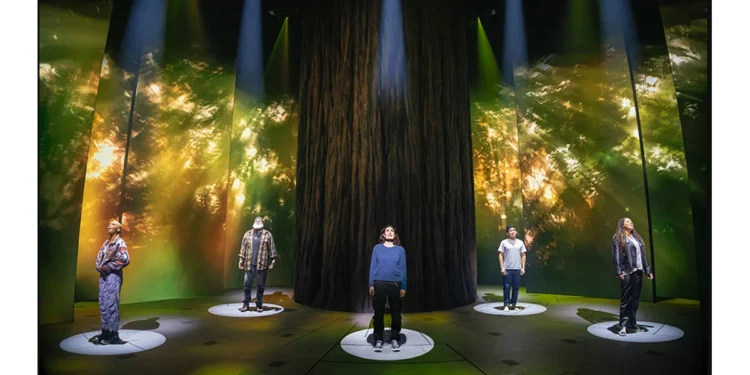Why the Drama Desk Awards Matter in 2025
The Drama Desk Awards 2025 Winners have once again captured the attention of theater lovers around the world, reaffirming their unique role in celebrating both Broadway and Off-Broadway talent. While the Tony Awards often grab more headlines, the Drama Desk has built a solid reputation for honoring creative innovation, outstanding performances, and daring productions that often go unnoticed in the commercial mainstream. As Broadway continues to recover post-pandemic, 2025 marked a historic year where diverse storytelling, fresh voices, and experimental productions finally took center stage.
Unlike other award shows that limit themselves to Broadway, the Drama Desk is uniquely democratic—it casts its spotlight on the entire New York theater scene. This inclusive approach is what makes its winner list so fascinating, and often unpredictable. In fact, this year’s ceremony was filled with moments that made jaws drop, not just for who won—but also for who didn’t.
Another reason why the Drama Desk Awards 2025 Winners list has generated so much buzz is the shifting trend in audience preferences. Traditional musicals were edged out by bold, socially relevant plays. Previously unknown actors stepped ahead of long-time stars. In a night full of cheers, tears, and social media explosions, this year’s ceremony wasn’t just about trophies—it was about cultural momentum. And as we explore the biggest surprises revealed, it becomes clear that the Drama Desk continues to reshape what theatrical success means today.
Top Winners Who Stole the Show
Among all the drama and applause, several winners clearly rose above expectations and made history. These names didn’t just walk away with trophies—they walked into theatrical legend. One such triumph came with “The Hourglass Riddle,” a breathtaking Off-Broadway production that swept three major categories, including Outstanding Play. Its director, Maya Linhart, stunned both fans and critics by outshining industry giants with her inventive staging and raw emotional delivery.
In the Outstanding Musical category, the widely acclaimed “Electric Reverie” was expected to dominate—and it did—but with added flair. With six total nominations, it clinched four wins, including Outstanding Music and Outstanding Lyrics. Critics praised its modern fusion of electronic orchestration with 1920s-style vaudeville—a risk that paid off artistically and critically.
Another standout was Jonas Reed, who bagged Outstanding Actor in a Play for his deeply nuanced performance in “Solitary Shadows.” Reed’s portrayal of an isolated WWII codebreaker drew comparisons to Daniel Day-Lewis for its precision and restraint. According to NYT reviewer Elaine Jacobs, “Reed gave a performance that transcended the stage and became part of the audience’s emotional memory.” Learn more
Here’s a quick breakdown of the top winners:
| Category | Winner | Production |
| Outstanding Play | The Hourglass Riddle | Off-Broadway |
| Outstanding Musical | Electric Reverie | Broadway |
| Outstanding Actor (Play) | Jonas Reed | Solitary Shadows |
| Outstanding Actress (Musical) | Camille Torres | Jukebox Juliet |
| Outstanding Direction | Maya Linhart | The Hourglass Riddle |
These wins weren’t just deserved—they signaled a broader shift in artistic appetite, favoring innovation over tradition, and authenticity over spectacle.
Unexpected Surprises That Shocked the Audience
The 2025 Drama Desk Awards were not short on jaw-dropping moments that sparked online conversations and live audience gasps. One of the most talked-about surprises was the win by “Static Heart,” a small, independently produced musical, for Outstanding Book of a Musical. With zero major promotional backing and only a six-week run, no one saw this coming. Yet, its story of digital addiction and teenage identity struck a powerful chord with voters.
Equally unexpected was the tie for Outstanding Revival of a Play between “The Crucible” and “La Cage aux Folles.” A tie is rare in any award show—but here it caused intense debate. While The Crucible brought classical fire, La Cage aux Folles infused its 2025 revival with gender-fluid casting and avant-garde costuming that critics either loved or loathed.
Social media exploded when Camille Torres beat out veteran musical queen Elaine Ramsey in the Outstanding Actress in a Musical category. Torres, a relative newcomer, brought fresh intensity to the role of Juliet in “Jukebox Juliet,” blending classical vocals with modern choreography.
Let’s look at some surprise moments from the night:
- Static Heart wins against Broadway giants
- Unprecedented tie for Revival of a Play
- Camille Torres upsets a Broadway legend
- Online outrage over ignored ensemble category
Behind the Curtain: The Voting Process Explained
Most theater fans enjoy the showbiz glitz, but few understand how winners are actually chosen at the Drama Desk Awards. The voting process is meticulous, designed to celebrate both artistic merit and industry evolution. The Drama Desk panel consists of critics, journalists, and editors who have closely followed theatrical productions throughout the year. Each member independently scores performances across various categories, followed by a group deliberation to finalize nominees and winners.
Transparency remains a topic of debate. Though the organization has recently made efforts to clarify its methodology, many still question whether personal bias and institutional preferences play a role. For example, some theater insiders speculate that The Hourglass Riddle’s emotional resonance may have influenced judges beyond technical metrics—highlighting the subjective nature of theatrical appraisal.
The Drama Desk also distinguishes itself by evaluating productions regardless of budget, popularity, or venue size. This gives Off-Broadway and even Off-Off-Broadway productions a legitimate shot at recognition, which isn’t the case in more commercially driven awards like the Tonys. However, this broad lens also means more competition, making it even more impressive for lesser-known works to take home wins.
By offering a hybrid model of critique and creative celebration, the voting process for the Drama Desk Awards continues to push the boundaries of what is traditionally honored in American theater. It’s not perfect, but its ever-evolving format helps ensure that innovation doesn’t get overshadowed by financial muscle.
Rising Stars to Watch After the 2025 Awards
If there’s one exciting takeaway from this year’s awards, it’s the emergence of fresh talent with sky-high potential. Every season introduces a few breakout stars, and 2025 was no exception. First on that list is Camille Torres, whose unforgettable performance in Jukebox Juliet has already landed her lead roles in two upcoming Broadway projects. With charisma, range, and contemporary appeal, she’s poised to become the next household name.
Then there’s Jonas Reed, the brooding lead of Solitary Shadows. Behind the scenes, new voices in direction and writing are also earning attention. Maya Linhart, now a triple Drama Desk winner, is being hailed as “the next Julie Taymor” thanks to her visually arresting, emotionally complex approach to stagecraft. With Netflix reportedly negotiating to adapt The Hourglass Riddle, her future appears as bright as her spotlight.
These rising stars are proof that the Drama Desk platform can elevate careers overnight, providing a critical springboard for young and underrepresented voices in theater. Expect to hear a lot more from them—not just on stage, but across all forms of storytelling.
How Audiences Reacted: Social Media and Public Buzz
If the judges had one vote each, the audience had thousands—on social media. Fan reactions ranged from celebratory to explosive. Many were thrilled by the diverse wins and recognition of Off-Broadway talents, viewing it as a sign of progress. Others, however, criticized certain omissions and questioned whether the panel was out of touch with public opinion. The omission of Voices Below, for instance, led to fan petitions. And open letters demanding explanation from the Drama Desk Committee.
Creators and actors themselves took to Instagram Live and X Spaces to share their behind-the-scenes experiences. Jonas Reed’s acceptance speech, in particular, was replayed over 2 million times across social platforms, lauded for its vulnerability and reflection on mental health.
This real-time engagement shows that the awards are no longer limited to a closed room of critics—they are part of a global conversation, amplified by the digital age. The line between critic and consumer continues to blur, suggesting that future ceremonies may need to factor in public sentiment more explicitly, or risk being labeled outdated by an increasingly vocal fanbase.
Snubs and Controversies That Stirred Debate
Where there are winners, there are always those left out—and 2025 had its fair share of snubs that left critics baffled and fans outraged. Leading the list was “Gilded Edge,” a critically acclaimed play expected to dominate several categories. Despite multiple nominations and massive audience turnout, it went home empty-handed. Theater Twitter was flooded with hashtags like #JusticeForGildedEdge within minutes of the ceremony ending.
Additionally, critics were divided on Maya Linhart’s triple win. Some hailed it as overdue recognition, while others saw it as a case of the Drama Desk overcorrecting in favor of artistic risk. Broadway journalist Thomas Kincaid wrote:
“While Linhart’s direction was moving, we must ask whether the voting body is favoring trend over substance.”
What These Wins Mean for Broadway’s Future
The Drama Desk Awards 2025 Winners weren’t just handed out—they sent a message. The age of cookie-cutter productions and safe storytelling may finally be fading. What took the stage this year were authentic narratives, emotional depth, and a willingness to tackle complex themes like mental health, gender identity, and technological isolation.
For producers, this shift means that backing bold, less commercially obvious projects may now come with artistic prestige. For actors and directors, it reinforces that breaking molds—rather than fitting into them—is the new pathway to critical acclaim.
Moreover, the wins this year suggest that Off-Broadway and fringe productions are no longer secondary—they’re at the heart of the theater world’s creative pulse. If these trends hold, we’re likely to see more diverse voices, experimental formats, and audience-involved narratives in upcoming seasons.
As theater analyst Ruth Delgado summarized:
“The 2025 Drama Desk Awards confirmed it: Theatre is no longer about escape. It’s about confrontation, transformation, and truth.”
Fazit: A Night to Remember
In every sense, the Drama Desk Awards 2025 were unforgettable. From thrilling wins to unexpected upsets, the night captured the vibrancy, tension, and evolution of modern theater. It honored those willing to take risks and sparked vital conversations about who gets recognized—and why.
Whether you’re a Broadway regular, a die-hard Off-Broadway supporter, or someone who simply loves great storytelling, this year’s winners list offers something meaningful. In celebrating excellence beyond the obvious, the Drama Desk Awards 2025 didn’t just recognize the best—they redefined what “best” means in the world of theater.
FAQs
Q1. Who was the biggest winner at the Drama Desk Awards 2025?
“The Hourglass Riddle” won multiple major awards including Outstanding Play and Direction.
Q2. Which award win surprised everyone the most?
The win of Static Heart in Outstanding Book of a Musical stunned both critics and fans.
Q3. Was there any major controversy during the awards?
Yes, the lack of non-binary representation in acting categories drew significant criticism.
Q4. What’s the difference between Drama Desk and Tony Awards?
Drama Desk includes both Broadway and Off-Broadway productions, while the Tonys only cover Broadway.

















